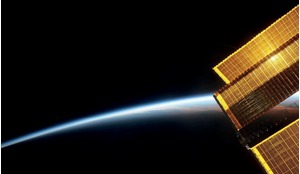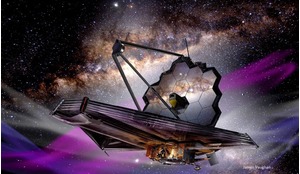When US President Obama signed a new law into existence in November 2015, it signalled a new direction for commercial space exploration and exploitation. The bill that was signed had ambitious beginnings in the US House of Representatives. That chamber has been working for several years to invigorate a private asteroid mining industry, starting with the attempt at passing the bill known as HR 5063 [3], which failed to gain the traction necessary to become law.
However, Congress tried again to draft legislation that would be more acceptable to the Senate and the President, and that properly addressed concerns over the level of respect the United States owed international law. The result was HR 1508, a bill that attempted to carve a law that would satisfy the needs of emerging space exploration companies whilst simultaneously heeding the international law obligations of the United States. HR 1508 was more successful than HR 5063 of the year before, and was itself absorbed into a larger space issues bill known as HR 2262, itself entitled the US Commercial Space Launch Competitiveness Act (‘Competitiveness Act’) . This was the act that became law for the US as of late 2015, the last ‘Title’ of which produced the rules now governing the emergence of any space mining activities arising from the United States.
Commercial rules
The Competitiveness Act modified four areas (‘Titles’) of space activity in the US. [4] Firstly, it made significant changes to commercial space launch rules, including asking appropriate government officials to coordinate with insurance companies about the required funds launchers will be required to obtain. It also added significant protections from liability to ‘spaceflight participants’ [5] during commercial space launches and, intriguingly, creates a new kind of space actor under US law - the ‘government astronaut’. [6]
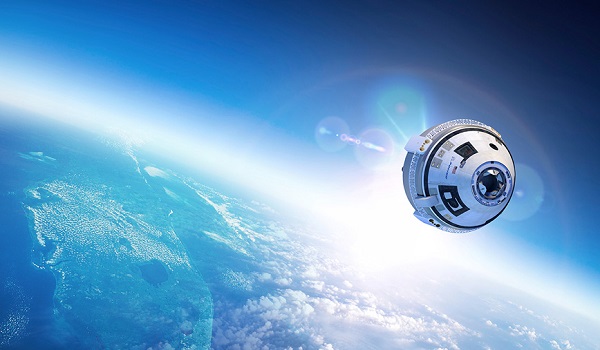 Boeing extended its company naming theme to the final frontier last September when its commercial human-rated spaceship was officially named CST-100 Starliner after previously being known simply as CST-100. An uncrewed test launch to the International Space Station (ISS) is planned for May 2017. Starliner missions will carry four astronauts to the ISS and some cargo on each trip. A fifth seat may be available for paying space tourists. Launch will be by United Launch Alliance’s Atlas 5 rocket from Cape Canaveral
Boeing extended its company naming theme to the final frontier last September when its commercial human-rated spaceship was officially named CST-100 Starliner after previously being known simply as CST-100. An uncrewed test launch to the International Space Station (ISS) is planned for May 2017. Starliner missions will carry four astronauts to the ISS and some cargo on each trip. A fifth seat may be available for paying space tourists. Launch will be by United Launch Alliance’s Atlas 5 rocket from Cape Canaveral
All of these changes seem to have been made to reflect the modern evolution of commercial space launch activities in the United States, and tend to reflect the policy of using private space providers to service many of the Federal Government’s space exploration needs.
Secondly, the Act reiterated the commitment of the US towards promoting private remote sensing activities, asking reports to be drafted to inform Congress of the number of applications for remote sensing licenses, the number denied, reasons for denial and other information generally designed to give legislators an analysis of the efficiency of the current system.
Next, the Act retitled the ‘Office of Space Commercialization’, housed within the Department of Commerce, as simply the Office of Space Commerce. It also fleshed out the roles and responsibilities of that Office, essentially mandating that it work towards generating the economic conditions necessary for the US space industry to grow and thrive - both domestically and internationally. [7]
The final Title was the Space Resource and Utilization Act of 2015, which strove to generate the governmental incentives and protections thought to be necessary to promote private commercial resource extraction initiatives. It is this last function of the Competitiveness Act that captivates the worldwide imagination, causing us to speculate whether the next great human endeavour in space is to engage in mining operations on a celestial body. [8]
Yet, despite this legislation, the question remains - is it lawful? Domestically, the US appears to see no obvious legal barriers to enabling private companies to go forth and mine. [9] However, US domestic legislation must pay respect to international obligations.
When the nations engaged in the diplomatic dance of creating new rules to govern the realm of space activities it was clear most preferred the concept of greater freedom
The United States is committed to encouraging and facilitating the growth of a US commercial space sector…’ [10] and so it is not suprising that the US Congress would extend commercial activities to space mining operations. Indeed, although the Space Resource Exploration and Utilization (SREU) Act is quite brief, it is nonetheless a significant evolution to currently sanctioned exploration arising in the United States. It is divided into three brief sections, comprising ‘definitions’, ‘commercial exploration and commercial recovery’, and ‘asteroid resource and space resource rights’.
In defining relevant terms, the drafters were clear that the types of resources to be extracted by commercial entities were either a ‘space resource’ (a resource found in space that is not biological in nature) or an ‘asteroid resource’, a ‘space resource found on or within a single asteroid’. [11] In other words, the content that could be removed in situ from the asteroid, not the asteroid itself.
The precise words used here seem intentional, since it relays to the world that the US has no intention to claim, by its own actions or by those of its non-governmental entities, any lifeforms discovered in space, nor would these private entities be empowered to exercise control over entire celestial bodies, since they can only make claims to resources that are in place.
Congress has also mandated that ‘appropriate’ federal agencies, along with the President, must remove barriers to the space resources industry and also help stimulate development. The President has been specifically tasked with facilitating the commercial recovery and exploration of space resources. [12]
At this stage, space resource entities are left to speculate where they will need to go, and under what circumstances, to resolve problems that arise
This is done by ensuring the removal of regulatory or bureaucratic obstacles in what Congress is hopeful will be an ‘economically viable, safe, and stable’ space resource industry. [13] Working in tandem, these provisions in the new law call for stout governmental promotion of a new space resource industry within the United States.
The last section substantially increases the rights of private space actors. Section 51303 grants several property rights to the in situ resources gathered in space. These include the right to obtain, transport, own, sell and use the resources, all tempered only by reference to ‘applicable’ law - including US domestic and international law. [14]
This section is the crux of the Act, giving property rights to space mining operators that will form the basis of their work both terrestrially and in space itself. It is also this section that gives rise to the most controversy, since it is uncertain how the provisions of the law will be enforced, and also because it may run counter to widely held interpretations of the Outer Space Treaty and its prohibition on extending sovereign control over celestial bodies.
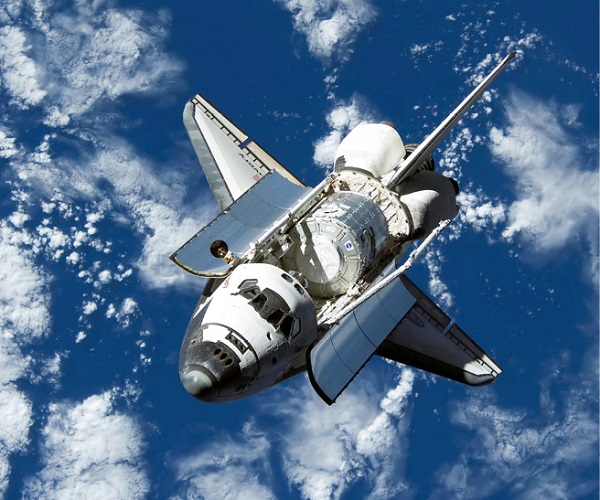 The US has made it State policy to encourage the commercial use of space, even launching private payloads on Space Shuttle missions
The US has made it State policy to encourage the commercial use of space, even launching private payloads on Space Shuttle missions
As for the first concern, while the SREU Act presents itself as a boon for the space mining industry, practical operations could be stalled until enforcement mechanisms are in place. The Act promotes the ability of mining entities to operate in space ‘free from harmful interference’, presumably from competing entities, yet it fails to provide redress for any harms that occur during operations.
Previous versions of asteroid bills tried to remedy these concerns upfront, with HR 1508 providing that civil actions for relief could be sought [15], and that they would be under the exclusive jurisdiction of the United States district courts, regardless of the amount in controversy. [16] At this stage, space resource entities are left to speculate where they will need to go, and under what circumstances, to resolve any problems.
The second concern is the degree of respect for and adherence to international law in the SREU Act. While it is true that the Act concludes with a pronouncement that the United States does not consider the law as asserting any kind of sovereignty over any celestial bodies, likely in an effort to assuage concerns that the US was enabling private companies to gobble up celestial bodies in a way forbidden by the Outer Space Treaty, claiming international law is respected is an entirely different matter from complying with its provisions. [17]
Of particular concern is the notion of owning materials extracted from space, since this could offend the sensibilities of Article II of the Outer Space Treaty. If setting up an extraction operation is determined to be an extension of sovereignty into space ‘by means of use or occupation, or by any other means’, [18] then these activities would stand in stark opposition to decades of legal protection for the space environment.
In contrast, the United States seems to be operating under the notion that Article I of the Outer Space Treaty permits mining activities, since space is meant to be free for the ‘use’ and exploration of all States. It is the word ‘use’ that is most deserving of clarification here.
However, in the absence of a clear prohibition, the US position could be summarised as an expression of State belief that the activity is not forbidden by international norms. Here, the US seems to be indicating that its interpretation of the Outer Space Treaty permits exploration and extraction operations.
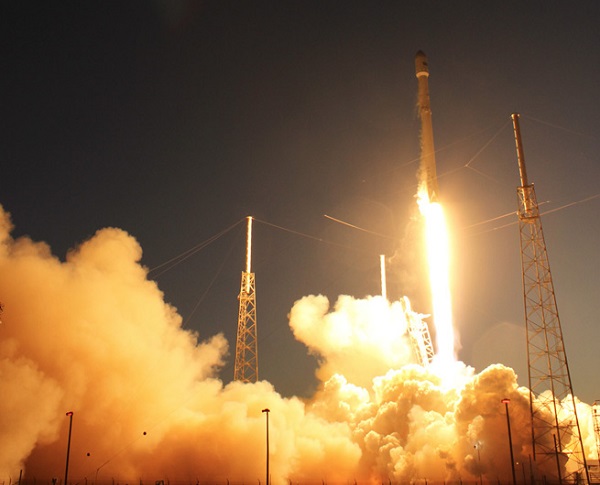 Launch of SpaceX Falcon 9 on 4 March 2016
Launch of SpaceX Falcon 9 on 4 March 2016
Finally, and compounding the international difficulties of the SREU Act, Congress is uncertain as to which federal agency would be best suited to effectuate the goals of the new law. [19] Without a determination as to which governmental authority will fulfil the authorisation and supervision requirements of Article VI of the Outer Space Treaty, it is unclear how the US can make good on its stated goal of respecting the ‘international obligations of the United States…’ [20] to which it is beholden. However, the fact that Congress has twice spent precious space in so short a law to mention these obligations is a sign that the legislative body intends for the US to continue to operate in good faith vis-a-vis international law.
Governing rules
It is no secret that the rules governing outer space activities are as widely respected as they are vague. From the perspective of the United States, exploring the Solar System for utilisable resources is not only permissible under the international treaty regime, it is necessary to fulfil the commercial ambitions of the Federal Government and the private sector alike.
It is no secret that the rules governing outer space activities are as widely respected as they are vague
The US Commercial Competitiveness Act and the Space Resource Extraction and Utilization Act attempt to motivate and protect commercial activities in space, working to shore up weak points in earlier legislation, as well as make the bold claim, that commercial space actors are not only permitted to go into space to obtain resources there but that they may have full property rights over what they discover in situ.
It is too early to predict the effect this may have on the industrialisation of asteroids or other celestial bodies. What is clear is that a concerted national effort is underway in the United States to begin using space in ways that have heretofore been the stuff of science fiction. Whatever the immediate ramifications of the new law may be, one thing is nearly certain - that these issues will continue to be at the forefront of legal discussions in the United States and the world for years to come.
References
1 Declaration of Legal Principles Governing the Activities of States in the Exploration and Use of Outer Space (1963), General Assembly Resolution 1962 (XVIII).
2 Treaty on Principles Governing the Activities of States in the Exploration and Use of Outer Space, including the Moon and Other Celestial Bodies, Jan. 27th, 1967, 18 UST. 2410, 610 U.N.T.S. 205, Art. I (hereinafter Outer Space Treaty).
3 HR 5063. This bill was known as the American Space Technology for Exploring Resource Opportunities in Deep Space Act, 113th Congress, 2nd Session (ASTEROIDs Act).
4 This is the short title of the Act passed in to law on November 25th, 2015, which began its life as HR 2262 in the US House of Representatives. It has since been given a “public law” citation in the form of P.L. 114-90.
5 HR 2262-3 (51 USC. § 50914(a)(4)(E)).
6 HR 2262-8, Sec. 112(c).
7 HR 2262-17, Sec. 302.
8 See, e.g., Mike Wall, Asteroid Mining May be a Reality by 2025, Aug. 11, 2015, http://www.space.com/30213-asteroid-mining-planetary-resources-2025.html.
9 However, the “minority report” included in HR 1508-the second attempt by the House to pass space mining legislation, did note that there were several concerns, including a lack of sufficient safety regulations to protect space flight participants, as well as the concern that the bill did not respect international law. See “Minority Views”, Report on Space Resource Exploration and Utilization Act of 2015, 114th Congress, 1st Session, Report 114-153, at 20-21.
10 National Space Policy of the United States, 2010, available at www.whitehouse.gov/sites/default/files/national_sp...
11 HR 2262-18 (51301(1-2(A)).
12 HR 2262-18 (51302(a)(1)).
13 HR 2262-18 (51302(a)(2)).
14 HR 2262-18 (51303).
15 HR 1508, proposed section 51303(c).
16 HR 1508, proposed section 51303(e).
17 Specifically, the Outer Space Treaty’s Art. II notes: “Outer Space, including the Moon and other celestial bodies, is not subject to national appropriation by claim of sovereignty, by means of use or occupation, or by any other means.”
18 Outer Space Treaty, Art. II.
19 The SREU Act mandates that a report be prepared that identifies which executive agencies would be best suited to authorize and supervise the commercial resource activities. HR 2262-18 (51302)(b)(1-2).
20 HR 2262-18 (51302)(a)(3).









